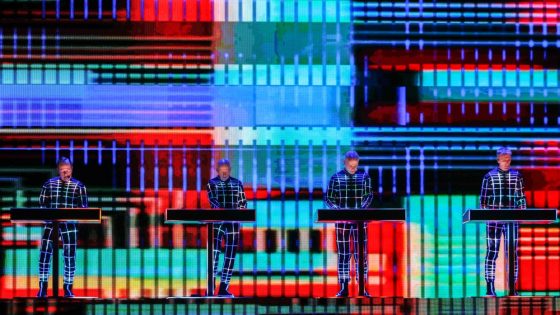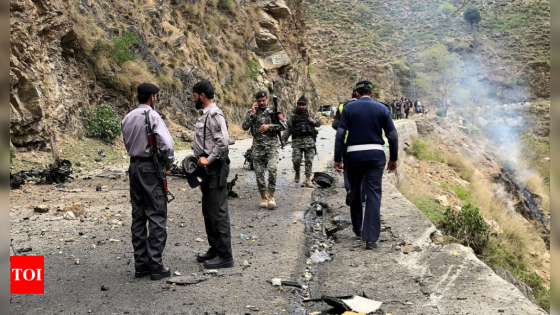Half a century ago, give or take a year, two of the most influential artists of the late 20th century released their respective breakthrough albums, each featuring a very long title track about driving down a specific regional highway. It might be a bit of a stretch to suggest that Bruce Springsteen’s “Born to Run” and Kraftwerk’s “Autobahn” represent the great divergence point in Western popular music — with organic, heart-on-a-sleeve sincerity on one side, and ironic future-shock electronic experimentation on the other — but that case can certainly be made, and it’s hard to think of many modern acts that don’t have some of either of those albums or artists in their musical DNA.
We’ll have to wait until 2025 to see what the Boss has planned for “Born to Run’s” golden anniversary. Until then, Kraftwerk got the celebrations started in earnest on Tuesday, playing 1974’s “Autobahn” in its entirety for the first night of its nine-show residency at Los Angeles’ Walt Disney Concert Hall. Reprising a series the group first played at New York’s Museum of Modern Art more than a decade ago, Kraftwerk will be highlighting each of its landmark albums throughout the coming week — nights dedicated to “Radio-Activity,” “Trans Europe Express” “Computer World,” “Techno Pop,” “The Mix” and a closing retrospective are still to come — but revisiting the record that all but invented synth pop and electronic dance music felt particularly special.
Photo: Boettcher
That said, if you were expecting the group to mark the anniversary with self-aggrandizing speeches or Springsteen-esque onstage storytelling… well, you may not be familiar with Kraftwerk. Düsseldorf’s finest were all business from the first minute of the show, which kicked off at precisely the advertised time. In what is surely a preview of nights to come, Tuesday’s concert saw “Autobahn” sandwiched into the middle of a two-hour set, preceded and followed by a sampling of greatest hits from throughout the band’s career. (In other words, no matter which night you catch, you’re still going to be in for the full Kraftwerk catalog experience.)
The group — now composed of lone remaining original member Ralf Hütter and his unspeaking, unsmiling colleagues Henning Schmitz, Falk Grieffenhagen and Georg Bongartz — barely moved throughout the performance, each musician anchored to their respective workstations. Yet Kraftwerk still offers one of the most visually engaging shows you’re likely to see, with spectacular video accompaniment and the “Tron”-style light-up bodysuits donned by each member offering no shortage of head-trip spectacle. (Endearingly, the lights on Grieffenhagen’s left boot suffered a malfunction early in the performance, and remained neon green for the remainder of the show even as the rest of the group’s ensembles changed color continuously. This is the closest thing to an unscripted moment you can expect at a Kraftwerk show.)
Dour demeanors aside, there was never any sense that the concert was simply a plug-and-play affair. Standards like “Numbers,” “Airwaves,” “Computer Love” and “The Man-Machine” sounded as massive and ahead-of-their-time as ever, with Hütter giving the late showstopper “Trans Europe Express” a few impromptu embellishments, turning that oft-sampled synth melody inside-out until the song resembled a midnight train to Transylvania. Of course, the central appeal of an in-its-entirety performance is getting to sift through the deep cuts, and “Autobahn” had plenty to offer beyond the still delightful 20-minute title track. The meditative, two-part “Kometenmelodie” offered a lovely little breather amidst all of the kling und klang of the heavy-hitters, while “Mitternacht” felt like something out of a horror movie, with video screens zooming in and out on an unnervingly placid nocturnal residential scene.
But for all the visual stimuli that Kraftwerk crammed into the evening, the real star of the show was the sound design. While so many of the group’s generations-later EDM heirs rely on denture-rattling bass drops to compensate for a muddy mix, Kraftwerk’s sound was perfectly calibrated for the Disney Hall’s acoustics. Every metallic skitter, twisted vocoder vocal line and synth bloop sounded just as crisp and immediate as they would on a pair of hi-fi headphones.
As painstakingly professional as the performance may have been, it is still strange to see Kraftwerk become a fully-fledged oldies act, with Hütter as the group’s sole proprietor. (Puckish co-founder Florian Schneider left the group in 2008 and passed away in 2020, while longtime members Wolfgang Flur and Karl Bartos each departed in the late ‘80s.) In an interview from earlier this year, Bartos wryly referred to Hütter as a “traveling salesman of nostalgia,” and one can understand why he’d be miffed to see the group that once pushed the boundaries of sonic possibility with every release now content to coast on past glories.

Photo: Boettcher
Photo + © 2023 Peter Boettcher
All the same, there was something undeniably poignant about the sight of Hütter, now 77, cutting a dignified figure in his Spandex suit, his rare unprocessed vocals now sounding very much like the voice of a septuagenarian. As Tuesday’s show reached its climax with a thunderous take on “The Robots” — showroom dummy likenesses of the band’s four members jerking and convulsing on the video screen while lighting strikes of red light erupted from backstage — it was hard not to think about the uneasy turn that technology has taken since Kraftwerk’s heyday. With every tech monopolist and Silicon Valley grifter now promising to bring about the sort of man-machine convergence that Kraftwerk has been pondering since the 1970s, it’s striking just how fundamentally human their music sounds today. No large-language model could have formulated the sly humor of “It’s More Fun to Compute” or “The Model.” No AI program will ever be sophisticated enough to behold a Casio calculator and think to compose a timeless song about it. Hütter himself has hinted that Kraftwerk may well keep going beyond his organic lifespan — “some programs keep running,” as he put it — but the secret of Kraftwerk is that it takes a flesh-and-blood heartbeat to keep these wheels in motion, and we should never take it for granted that they will continue after this one powers down.
Indeed, for all his deadpan lack of sentimentality, one had to imagine Hütter breaking into something resembling a smile as he left the stage to a standing ovation after “Musique Non Stop,” a fully-deserved acknowledgement for a body of work that has shifted the course of popular music in countless ways over the last 50 years. He is, as Kraftwerk’s most accomplished students might put it, human after all.
Setlist
Numbers
Computer World
Home Computer/It’s More Fun to Compute
Spacelab
Airwaves
Tango
The Man-Machine
Electric Cafe
Autobahn
Kometenmelodie 1
Kometenmelodie 2
Mitternacht
Morgenspaziergang
Computer Love
The Model
Tour de France
Trans Europe Express
The Robots
Planet of Visions
Boing Boom Tschak/Musique Non Stop
Source Agencies



